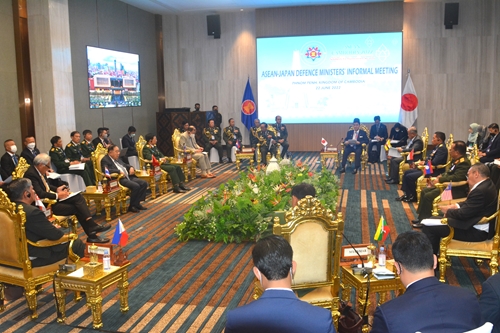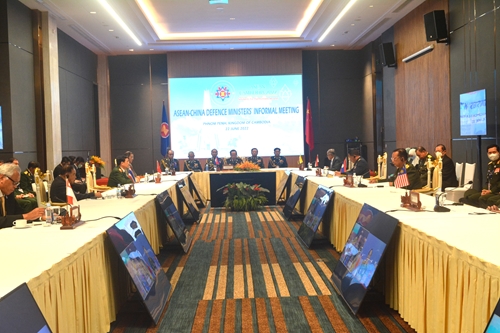At the informal meeting between defense ministers of ASEAN and Japan, Japanese Minister of Defense Kishi Nobuo affirmed that Japan supports ASEAN’s centrality in regional cooperation mechanisms. He suggested the two sides strengthen defense cooperation in the fields that are important to ASEAN, including improvement of maritime security, human resource quality, cyber security, and response to impacts of climate change on regional security.
    |
 |
|
ASEAN members attend a meeting during the ASEAN-Japan Defense Ministers Informal Meeting in Phnom Penh, Cambodia, on June 22, 2022. |
Head delegates of ASEAN highly appreciated Japan’s role in maintaining peace and stability in the region. They thanked Japan for providing vaccine and giving other support for ASEAN countries in the COVID-19 fight efforts. They stressed that they back Japan’s Vientiane Vision 2.0 on promoting defense cooperation with ASEAN, creating a driving force for the maintenance of regional peace, stability and security.
Addressing the ASEAN-Japan Defense Ministers’ Informal Meeting, Vietnamese Defense Minister General Phan Van Giang spoke highly of the importance of the ASEAN-Japan relations. He reaffirmed Vietnam’s viewpoint on regional security situation. He also confirmed the country’s consistent view of resolute and persistent settlement of disputes and disagreements at sea by peaceful means on the basis of international law, including the U.N. Convention on the Law of the Sea (UNCLOS) 1982 and related sides needing to respect legal and diplomatic processes.
To promote the partnership in a further effective manner in the time ahead, the Vietnamese head delegate suggested the two sides continue to bring into play the efficiency of the annual ASEAN-Japan meeting at the deputy minister level, and focus on cooperation fields which Japan has strengths and ASEAN needs such as information technology, cyber security, humanitarian assistance and disaster relief, among others.
General Giang also suggested two sides continue close coordination in implementing activities of the ADMM+ Experts’ Working Group (EWG) on Peacekeeping Operations as co-chairs of the EWG.
At the ASEAN-China Defense Ministers’ Informal Meeting, Chinese Minister of National Defense Wei Fenghe confirmed that ASEAN is an important partner of China. The Chinese senior official suggested ASEAN and China further deepen the strategic trust in line with their comprehensive strategic partnership. He also gave suggestions on the resumption of the implementation of cooperation activities in the offline format and coordination to respond to non-traditional security challenges, especially in the post-pandemic recovery.
Expressing thanks to China for providing vaccine and other medical supplies for ASEAN countries to combat COVID-19, ASEAN head delegates acknowledged and spoke highly of China’s support for ASEAN’s central role and its participation in and contribution to ADMM+, particularly co-chairing EWGs. The ASEAN side recommended the two sides to enhance their defense ties to handle non-traditional security challenges, thereby upholding peace, stability, and security in the region.
    |
 |
|
At the ASEAN-China Defense Ministers Informal Meeting |
In his speech, Defense Minister Giang highly appreciated China as a comprehensive strategic partner of ASEAN, in which bilateral defense and security cooperation continues playing an important role.
The Vietnamese senior official expressed support for China's proposals to enhance mutual understanding and trust-building, including the exchange of young officers, intermediate-level officers, the exchange among defense research institutes of ASEAN and China, and the expansion of the direct communication line infrastructure connecting ASEAN with its partners, including China.
Regarding the East Sea (internationally South China Sea) issue, the head of the Vietnamese delegation suggested involved parties continue to fully and effectively implement the Declaration on the Conduct of Parties in the East Sea (DOC) and other regional commitments, thereby creating a favorable environment for the COC negotiation process, contributing to early achieving an effective and substantive COC consistent with international laws, including UNCLOS 1982.
Translated by Mai Huong